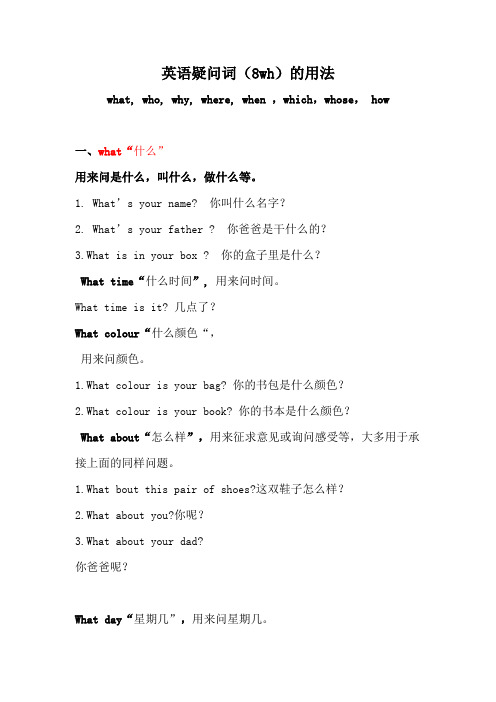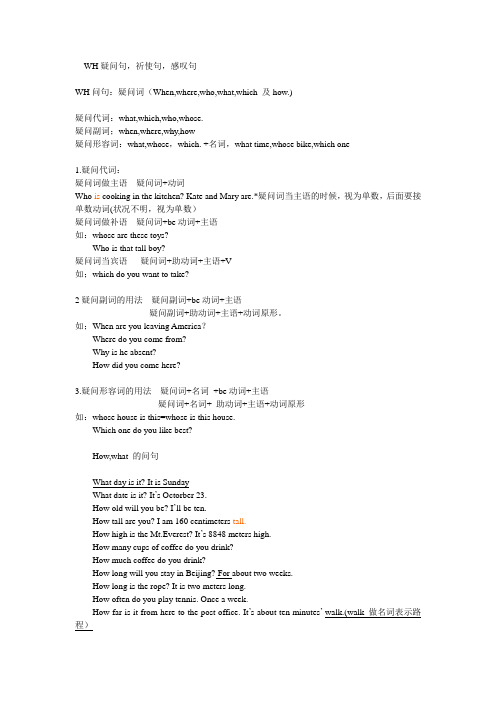Wh- (where, when, who, what time)-How often question
- 格式:doc
- 大小:27.50 KB
- 文档页数:2

阅读(传统)阅读做题步骤1.先通读5个问题--把握话题走向2.细化每个题目,注意按照题型分类做(细节题,主旨题,推理题,作者态度题、猜词题)一、事实细节题1.出题形式(1)wh-型(who,what,when,where,why,how...)时间,地点,人物,原因,事件,方式(2)是非型(true or false;right/correct;wrong)2.做题方法定位原文,比较选项(1)绝对词通常不选--all,must,absolutely,only,never,completely,definitely,any, no,none(2)常考处:列举并列处常考列举First,Second,Third并列A,B and C特殊标点处常考破折号,括号,冒号表示解释说明;引号表示用用某人的观点或某人说的话;感叹号表示作者的情感和态度。
这些标点前后的信息都常常是考点。
举例处常考用例子证明作者观点such as;for instance;a case in point,as....as..因果关系常考because,since,for,as,so,therefore,consequently,as a result转折对比处常考however,but,while,yet,nevertheless,other than...(3)可照搬原文,但多考同义改写(4)选项种有正反意思出现时,答案往往再其中Youth is a time when there are few tasks to make life difficult.If a child has good parents,he is fed,looked after and loved whatever he may do.It is impossible that he will ever again in his life be given so much without having to do anything in return. In addition,life is always presenting new things to the children—things that have lost their interest for older people because they are too well-known.....57.When people were young,they used to_______.A.be in charge of many businessesB.have few things to think about and take onC.look after their younger sisters and brothersD.face a lot of difficultiesAgain,in the modern world we use our brains a great deal.Even so,we still make use of only about20%of the brains capacity.As time goes on,however,we shall haveto use our brains more and more,and eventually we shall need larger ones.This is likely to bring about a physical change too—the head,in particular the forehead,will grow larger.53.Man’s forehead will grow larger because_______.A.he will make use of only about20%of the brain’s capacityB.the other80%of his brain will grow in due timeC.he had rather narrow forehead a few hundred years agoD.he will have to use his brain more and more as time goes on二.主旨大意题1.出题形式文章大意类What is the passage mainly about?What’s the main idea of this passage?What’s the best title for the passage?What’s the writer’s purpose in writing the passage?The writer of the passage wants to tell us that2.做题方法(1)概括法(2)高频词法(2)首尾呼应法(首段首句+尾段首句)Procrastination(犹豫不决)is a disease of the mind.A scientific study in recent years has shown that it is a close relative of sadness and attention disorder;that procrastinators tend to be the result of low self-confidence and are likely to experience anxiety.41.What is the main topic of this passage?A.Don’t hesitate to give up smoking.B.Don’t regard depression as not important.C.Delay can be a sign of illness.D.Don’t work too hard to stay healthy.三、推理判断题1.出题形式(1)We can infer from the(first/last)passage that________.(2)The passage/author implies/suggests that______.2.做题方法(1)不选照搬原文选项(2)判断有据,推论有理,忠实原文。

英语疑问词(8wh)的用法what, who, why, where, when ,which,whose, how一、what“什么”用来问是什么,叫什么,做什么等。
1. What’s your name?你叫什么名字?2. What’s your father ? 你爸爸是干什么的?3.What is in your box ? 你的盒子里是什么?What time“什么时间”,用来问时间。
What time is it? 几点了?What colour“什么颜色“,用来问颜色。
1.What colour is your bag? 你的书包是什么颜色?2.What colour is your book? 你的书本是什么颜色?What about“怎么样”,用来征求意见或询问感受等,大多用于承接上面的同样问题。
1.What bout this pair of shoes?这双鞋子怎么样?2.What about you?你呢?3.What about your dad?你爸爸呢?What day“星期几”,用来问星期几。
1.What day is it today?今天星期几?2. What day was yesterday? 昨天星期几?What date“什么日期”,问具体的日期。
1.What’s the date today? 今天是几号?What …for“为何目的”,用来问目的,在一定情况下只可以与why 互换。
1.What did you buy that for? 你为什么要买那个?2.Why didi you buy it?二、when“什么时候”,用来问时间。
1.When do you get up?你什么时候起床?2. When did you go there? 你什么时候去的那里?三、where“哪里”,用来问地点。
1. Where is my ruler ?我的尺子在哪里?2.Where are you from? 你是哪里人?3. Where are you going to ? 你打算去哪里?四、which“哪一个”,用来问具体的哪一个。

英语疑问词(8wh)的用法what, who, why, where, when ,which,whose, how一、what“什么”用来问是什么,叫什么,做什么等。
1. What’s your name?你叫什么名字?2. What’s your father ? 你爸爸是干什么的?3.What is in your box ? 你的盒子里是什么?What time“什么时间”,用来问时间。
What time is it? 几点了?What colour“什么颜色“,用来问颜色。
1.What colour is your bag? 你的书包是什么颜色?2.What colour is your book? 你的书本是什么颜色?What about“怎么样”,用来征求意见或询问感受等,大多用于承接上面的同样问题。
1.What bout this pair of shoes?这双鞋子怎么样?2.What about you?你呢?3.What about your dad?你爸爸呢?What day“星期几”,用来问星期几。
1.What day is it today?今天星期几?2. What day was yesterday? 昨天星期几?What date“什么日期”,问具体的日期。
1.What’s the date today? 今天是几号?What …for“为何目的”,用来问目的,在一定情况下只可以与why 互换。
1.What did you buy that for? 你为什么要买那个?2.Why didi you buy it?二、when“什么时候”,用来问时间。
1.When do you get up?你什么时候起床?2. When did you go there? 你什么时候去的那里?三、where“哪里”,用来问地点。
1. Where is my ruler ?我的尺子在哪里?2.Where are you from? 你是哪里人?3. Where are you going to ? 你打算去哪里?四、which“哪一个”,用来问具体的哪一个。

疑问词一、常见的疑问词:what什么(询问事物)why为什么(询问原因)who谁(询问人)where哪里(询问地点)when何时,什么时间(询问时间)which哪个/些..(询问哪一个)how(询问怎么样或方式)whose(询问物体的主人)例:—What is this? 这是什么?—It's a key. 这是一把钥匙。
二.常见的疑问词搭配:how much多少;多少钱(询问价格或不可数名词的数量)how old多大年龄,几岁(询问年龄)how many 多少(询问可数名词的数量)what time 几点,什么时间(询问时间,尤其是点钟),what kind of什么品种,什么样的(询问种类),how far多远(询问路程,距离)how long多久,多长(询问时间长短,物体的长度)how often多久(一次)(询问频率,次数)how soon多久(常用于将来时,询问多长时间以后能...-How soon can he get here?-He can get here in half an hour.—How much is it? 这个多少钱?—It's twenty dollars. 二十美元。
—What kind of movies do you like? 你喜欢哪一类型的影?—I like action movies. 我喜欢动作片。
以疑问词who,what,when,which,why,where,whose,how等引导的问句都叫特殊疑问句,也叫疑问词疑问句有时还被称为wh-问句(wh-question)。
结构一般为:疑问词+助动词+主语+主动词等。
作为疑问词的what可以用来询问名字、国籍、工作、颜色、型号等。
例如以下几个问句:What make is this car? 这辆小汽车是什么牌子的?What nationality are you? 你是哪国人?What is your job? 你的工作是干什么?What colour is it? 它是什么颜色的?What size is this skirt? 这条裙子是多大号的?二英语中,疑问词有哪些?用疑问词引导的疑问句叫做特殊疑问句。

WH疑问句,祈使句,感叹句WH问句:疑问词(When,where,who,what,which 及how.)疑问代词:what,which,who,whose.疑问副词;when,where,why,how疑问形容词:what,whose,which. +名词,what time,whose bike,which one1.疑问代词:疑问词做主语疑问词+动词Who is cooking in the kitchen? Kate and Mary are.*疑问词当主语的时候,视为单数,后面要接单数动词(状况不明,视为单数)疑问词做补语疑问词+be动词+主语如:whose are these toys?Who is that tall boy?疑问词当宾语疑问词+助动词+主语+V如;which do you want to take?2疑问副词的用法疑问副词+be动词+主语疑问副词+助动词+主语+动词原形。
如;When are you leaving America?Where do you come from?Why is he absent?How did you come here?3.疑问形容词的用法疑问词+名词+be动词+主语疑问词+名词+ 助动词+主语+动词原形如:whose house is this=whose is this house.Which one do you like best?How,what 的问句What day is it? It is SundayWhat date is it? It’s Octorber 23.How old will you be? I’ll be ten.How tall are you? I am 160 centimeters tall.How high is the Mt.Everest? It’s 8848 meters high.How many cups of coffee do you drink?How much coffee do you drink?How long will you stay in Beijing? For about two weeks.How long is the rope? It is two meters long.How often do you play tennis. Once a week.How far is it from here to the post office. It’s about ten minutes’ walk.(walk 做名词表示路程)。

五年级下册英语课文中出现的wh问句一、基本概念通常以特殊疑问词开头,对句中某一成分提问的句子叫特殊疑问句。
常用的疑问词有:what 、who 、whose 、which、 when 、where how、 why等。
1.问“谁”用who;2.问“谁的”,用whose;3.问“地点哪里”,用where;4.问“原因”,用why;5.问“身体状况”,用how;6.问“方式”,用how;7.问“年龄”,用how old;8.问“多少”,可数用how many;不可数用how much;9.问"价钱”用how much;10.问“哪一个”,用which ;11.问“什么”,用what;12.问“颜色”,用what colour;13.问“星期”,用what day;16.问“什么时候”,用when;17.问几点用What’s the time?或 What time is it?如果掌握规律,就变得简单多了。
总结一条就是:“特殊疑问词+一般疑问句”,但特殊疑问词的确定要根据划线内容确定,在小学阶段常出现的有以下几种:1.划线部分是“事或物”,特殊疑问词用whatEg: This is a bag. ---What is this?We often play football on Sundays .---What do you often do on Sundays ?2、划线部分是“人”,特殊疑问词用whoEg:She is my sister. ---Who is she ?3、划线部分是“地点”,特殊疑问词用whereEg:The apple is on the desk.---Where is the apple ?4、划线部分是“时间”,特殊疑问词用what time或whenEg:It's six thirty . ---What time is it ?I usually get up at six forty .--- When do you usually get up?5、划线部分是“年龄”,特殊疑问词用how oldEg:I am twelve . ---How old are you?My mother is thirty- two . ---How old is your mother ?6、划线部分是“职业”,特殊疑问词用whatEg:Tom is a worker. ---What is Tom?/What do you do ?7、划线部分是“颜色”,特殊疑问词用what colourEg:My hat is blue . ---What colour is your hat?8、划线部分是“数量”,特殊疑问词用how many或how muchEg:I can see five birds in the tree.---How many birds can you see ?There is some tea in the cup.---How much tea is there in the cup ?9、划线部分是“多少钱”,特殊疑问词用how muchEg:This book is ten yuan . ---How much is this book ?10、划线部分是“形容词性物主代词或名词性物主代词”,特殊疑问词用whoseEg:That is my shirt . ---Whose shirt is that ?11、对距离提问:The factory is two kilometers from here.--- How far is the factory from here?12、对长度提问:The ruler is one metre long.---- How long is the ruler?13、对星期提问:Today is Monday.---- What day is it today?It’s May 2 today. --- What’s the date today?14、对种类(后置定语)提问:I want the cakes with nuts in them .------What kind of cakes do you want?二、小学英语对划线部分提问答题口诀:一代(用疑问词代替划线部分),二移(把疑问词移至句首),三找(找is , are ,can,would)抄在疑问词后,没有则用do,does(用于主语是第三人称),出现I am 则直接改为Are you),四抄(照抄其它部分)五改(出现some,要考虑是否改为any。
英语疑问句用法:what how who why where whe n which whose谁的什么怎样谁为什么哪里什么时候哪一个一、what 什么用来问是什么,叫什么,做什么等1. Whaf s your name 你叫什么名字2. What' s your father 你爸爸是干什么的is in your box 你的盒子里是什么What time 什么时间用来问时间What time is it 几点了What time is it now 现在几点了What colour 什么颜色用来问颜色1. waht colour is your bag 你的书包是什么颜色2. what colour is your book 你的书本是什么颜色What about 怎么样用来征求意见或询问感受等,大多用于承接上面的同样问题1. what bout this pair of shoes 这双鞋子怎么样2. what about you 你呢3. what about your dad 你爸爸呢What day 星期几用来问星期几1. what day is it today 今天星期几2. what day was yesterday 昨天星期几What date 什么日期问具体的日期1. Wha' s the date today 今天是几号2. what date is tomorrow 明天是几号What…for 为何目的用来问目的,在一定情况下只可以与why互换What did you buy that for 你为什么要买那个二、when 什么时候用来问时间1. whe n do you get up 你什么时候起床2. whe n did you go there 你什么时候去的那里三、where 哪里用来问地点1. where is my ruler 我的尺子在哪里2. where are you from 你是哪里人3. where are you going to 你打算去哪里四、which 哪一个用来问具体的哪一个1. which seas on do you like best 你最喜欢哪个季节2. w hich class are you in 你在哪一个班3. w hich one is my pen 哪一个是我的钢笔五、who 谁用来问人物是谁1. w ho is that boy那个男孩是谁2. who are you going to with 你打算和谁一起去3. Who is that pretty lady 那个漂亮的女士是谁六、whose 谁的用来问东西是谁的1. whose bag is this 这是谁的包2. w hose bike is yellow 谁的自行车是黄色的七、why 为什么用来问原因1. why do you like spri ng 你为什么喜欢春天2. why did you go there 你为什么去那里八、how 怎么样用来询问身体等状况1. how are you 你好吗2. how is your mother 你妈妈好吗How old 几岁用来问年龄1. how old are you 你几岁了2. how old is your father 你爸爸多大了How long 多长用来问长度1. how long are your legs 你的腿多长2. how long is your pen cil 你的铅笔多长How big 多大用来问物体的大小1. How big is your bedroom 你的卧室多大How tall 多高用来问高度1. How tall is your brother 你弟弟有多咼How heavy 多重用来问重量1. How heavy are you 你有多重2. How heavy is this box 这个箱子有多重How far多远用来问路程1. How far can you dive un der the water 在水下你能游多远2. How far is it from here 从这儿去有多远How many 多少用来问数量1. How many apples do you have 你有多少苹果2. How many days are there in a year 一年有多少天How much 多少钱用来问价格1. how much is this dress 这个连衣裙多少钱2. how much are these desks 这些桌子多少钱How about 怎么样用来征求意见或询问感受等,大多用于承接上面的同样问题, 用法与what about相同1. how about you 你呢2. w about that shirt 件衬衣怎么样。
where what who when how的用法在英语中,“where”、“what”、“who”、“when”和“how”是五个常用的疑问词,它们可以用来引导各种疑问句。
以下是它们的具体用法和注意事项:“where”:用于询问地点或位置。
例如:“Where is the nearest ATM?”(最近的ATM在哪里?)需要注意的是,“where”也可以用于询问抽象的概念,如时间(“Where did you spend your summer vacation?”你在哪里度过暑假的?)和方式(“Where did you learn to speak English?”你是在哪里学会说英语的?)。
“what”:用于询问事物、情况或事件。
例如:“What is your favorite color?”(你最喜欢的颜色是什么?)需要注意的是,“what”也可以用于询问职业(“What do you do for a living?”你的职业是什么?)和国籍(“What country are you from?”你是哪个国家的?)。
“who”:用于询问人或人的身份。
例如:“Who is that man over there?”(那边那个男人是谁?)需要注意的是,“who”也可以用于询问亲属关系(“Who is that woman your mother?”那个女人是谁,你妈妈吗?)和任何身份(“Who are you?”你是谁?)。
“when”:用于询问时间。
例如:“When is the next train to New York?”(下一班开往纽约的火车是什么时候?)需要注意的是,“when”也可以用于询问日期(“When is your birthday?”你的生日是什么时候?)和时代(“When did you start learning English?”你什么时候开始学习英语的?)。
wh的用法总结一、什么是wh疑问词?疑问词(也称为疑问代词)是用来引导疑问句的单词,在英语中起着非常重要的作用。
在这篇文章中,我们将重点介绍以wh字母(what、when、where、who、why以及how)开头的疑问词的用法。
通过掌握这些疑问词的使用方式,你将能够更加流利地提出问题,并理解别人对你提出的问题。
二、What:询问事物或情况首先,我们来看一下“What”的用法。
What被用来询问具体的事物或情况。
事物可以是名词,情况可以是形容词。
例如,“What is your favorite color?”(你最喜欢的颜色是什么?)和“What time is it?”(现在几点了?)。
通过使用“What”,你可以向别人征求信息并扩大自己的知识范围。
三、When:询问时间接下来,让我们看一下“When”的用法。
When专门用来询问具体的时间点或时间段。
“When will the concert start?”(音乐会什么时候开始?)和“When is your birthday?”(你的生日是什么时候?)这些句子展示了“How”如何寻找关于时间方面的答案。
四、Where:询问地点然后,我们来看一下“Where”的用法。
Where用来询问具体的地点。
“Where is the nearest bookstore?”(最近的书店在哪里?)和“Where did you go on vacation?”(你去度假的地方是哪里?)这些问题都使用了“Where”来确定特定的位置。
五、Who:询问人或群体继续向前推进,我们来学习一下“Who”的用法。
Who被用于询问一个人或一个群体。
“Who is your best friend?”(你最好的朋友是谁?)和“Who won the game?”(谁赢得了比赛?)这些句子都在寻找关于个人身份或团体成员的信息。
六、Why:询问原因现在,我们转向学习“Why”的用法。
wh-引导的主语从句
“wh-引导的主语从句”是指以疑问代词(如what、which、who、where、when等)引导的主语从句。
这种从句在英语语法中是一种常见的结构,用于表达对某事物的疑问或不确定性。
以下是几个“wh-引导的主语从句”的示例:
1.Who will win the election is still unknown.(谁将赢得选举仍然未知。
)
2.What caused the accident remains a mystery.(是什么导致了事故仍然
是个谜。
)
3.When the plane will arrive is not clear.(飞机何时到达尚不清楚。
)
4.Which team will win the game is anybody's guess.(哪个队会赢得比赛
是任何人都猜测不到的。
)
5.Where to find the missing child is a urgent matter.(在哪里找到失踪的
孩子是件紧急的事情。
)
总的来说,“wh-引导的主语从句”是英语语法中的一种结构,通常用于提出疑问或表达不确定性。
这种结构常用于句子的开头,作为主语,后续的谓语动词对其提出的问题或不确定性进行描述或回答。
Type “Wh- (Where, when, who) / How often” Questions
Question : How often do you go to the cinema?
Answer
Well, to be honest, I think I would have to say that it really depends. Like for instance, if I have the money, then it’s quite possible that I will watch a movie in the cinema, two or three times a month. You know, cinema tickets are pretty pricey in China. Whereas in contrast, if I’m broke, then it’s more likely that I’ll watch movies at home on DVDs; you probably know that DVDs are quite cheap here, especially compared to the price of a cinema ticket.
Opening phrase
1.Well, to be honest,
“Depends” phrase
2.I think I would have to say that it really depends.
Linking phrase
3.Like for instance,
Conditional grammar structure
4.if I have the money,then it’s quite possible that I will watch a movie in the cinema, two or three times a month. You know, cinema tickets are pretty pricey in China.
Compare linking phrase
5.Whereas in contrast,
Conditional grammar structure
6.if I’m broke,then it’s more likely that I’ll watch movies at home on DVDs; you probably know that DVDs are quite cheap here, especially compared to the price of a cinema ticket.
Other Opening phrases
Well in truth
Well, in all fairness
Actually, to be fair
In fact, in all honesty
In actual fact
Other“Depends” phrase
…I suppose I would have to maintain that it kind of depends really
…I imagine that it would depend on the situation
…I guess my answer would be determined by different conditions
Other Linking phrase
More precisely li ke…
Like more specifically…
Like, to be more direct…
You know like, to be exact
Other Conditional grammar structure
If (situation A)……then I will most likely…..
If (situation A)……then as a consequence I will probably….
If (situation A)……then I guess it’s quite likely that I will…. Situation A Situation B Weekdays Weekends Summer Winter
Good weather Bad weather Term time School holidays If I’m alone If I’m with friends If I’ve got a lot of time If I’m fairly busy Other Compare linking phrase
Whereas on the other hand
Though, at the same time
While, oppositely
Other Conditional grammar structure
If (situation B)……then it’s almost certain that I will….
If (situation B)……then I will almost always….
If (situation B)……then I will most certainly ……。